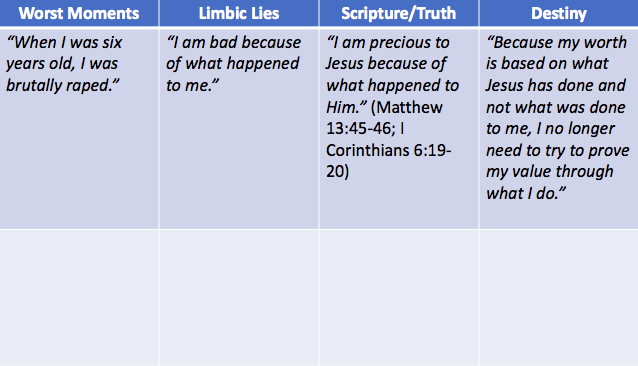“31 Then Jesus said to those Jews who believed Him, ‘If you abide in My word, you are My disciples indeed. 32 And you shall know the truth, and the truth shall make you free.’ ” John 8:31-32
Addictions are often fueled by shame-based lies that are inserted into the limbic system of our (right) brains when trauma takes place in our lives. The limbic system is usually programmed by the time we are six years old. Our prefrontal cortex (our moral and impulse control system) of the (left) brain is not developed until we are twenty-five years of age. Over ninety-eight percent of the decisions we make in life are done subconsciously in the limbic system. So much of our lives are directed by patterns of the past.
Also, the limbic system is programmed to help us cope and survive, and coping behavior is at the core of addictive behavior. When we take sinful coping mechanisms and make them a lifestyle, we experience bondage.
Most addicts have wounds that were caused during childhood or adolescence that fuel their addictions as adults. For example, when a six-year old boy is brutally raped and then threatened by his rapist, Satan can easily insert a lie associated with that intense trauma that says, “This happened to me because I am bad.” That little boy grows up believing this lie. At the core of his being he believes he is flawed and that no one could possibly love him if they knew him. The shame from this lie leads him to turn to sexual addiction as an adult to numb the pain from his unresolved trauma.
Trauma comes in many forms and it can be experienced as a child and as an adult. High intensity trauma such as military combat, a natural disaster, physical or sexual abuse, the death of a family member, or divorce can leave deep wounds within one’s soul. But one does not have to experience intense trauma to struggle with shame-based lies and addictions. You may have experienced low intensity trauma that takes place frequently such as neglect, verbal rejection, minimal affection, teasing by a stepbrother, having few friends, etc. The cumulative effect of low intensity trauma can be just as damaging as high intensity trauma.
However, not everyone who has an addiction has major wounds or trauma. Some people turn to addictions when they feel stressed to medicate their pain. In other words they have developed unhealthy coping mechanisms or sinful addictions to deal with their stress.
Our sinful addictions do not stop with believing in Christ for His gift of everlasting life. That is only the beginning. I must also CONTINUE IN CHRIST’S WORD (John 8:31-32). The Bible says, “31 Then Jesus said to those Jews who believed Him, ‘If you abide in My word, you are My disciples indeed. 32 And you shall know the truth, and the truth shall make you free.’ ” (John 8:31-32). To “abide” (menō) in Christ’s Word means “to continue or remain” in Jesus’ teaching – literally, “to make one’s home at.” Where we make our home is where we spend our time. The Jews knew a lot of Scripture, but they did not know the Author of the Scriptures. “Knowing the truth” means knowing Christ who is the truth (John 14:6; cf. 8:32, 36).
How do I abide in Christ’s Word? Early in my Christian life I learned a method of abiding in Christ’s Word that was primarily for my left brain, not my right brain or limbic system. That method basically focused on downloading biblical data into my left brain through reading, studying, and memorizing Scripture. But keep in mind that most of our decision making takes place in the right brain, albeit at an unconscious level. So if all I am doing is downloading Scripture into my left brain, I am going to experience little transformation. In the last year I have learned a new method of abiding in Christ’s Word that is for both the left and right parts of the brain. This method involves an acrostic, S.W.O.R.D., from Seven Pillars of Freedom by Dr. Ted Roberts:
S – Scripture. For over twenty years, I have read through the entire Bible each year. I was so busy reading through my required passages to get through the Bible in a year, that it became another hurried thing I did in my busy schedule. But now, I approach God’s Word meditatively – not to analyze or criticize the Word, but to be analyzed and challenged by God’s Word. So first, I write God’s Word down on paper. Writing it down will help your thoughts to slow down and focus on the truth of the Scripture.
W – Wait. Read the Scripture again on your knees if possible. Read it aloud slowly and attentively. Then pause to let the passage sink in. Read the Scripture again, this time asking yourself the following questions, “What do I see? What do I hear? What do I feel? Where am I in this passage?” Finally read the passage again noticing what word or words grab your attention. Focus on those words. Chew on them for a few minutes. We have a tendency to intellectualize Scripture instead of experience God’s Word. During the waiting, we want to involve multiple senses – sight, hearing, feelings, touch, etc., to come to our observation about God, ourselves, and others.
O – Observe. Take a seat and write down what you observed in the Scripture. When we journal the Scriptures, we retain sixty percent more of what we learn. What truth do you discover in these verses? How does God see me and how do I see God and me? This will clarify your thought processes and involve another whole section of your brain.
R – Request that the Holy Spirit help you see how all of this applies to your life. This is not an academic process but a process of the heart. You are specifically asking the Word to analyze you instead of you analyzing the Word. This often triggers a neurochemical cascade of new understanding where your mind is being renewed.
D – Dedicate. What helps us from being just touched by God to being transformed is the commitment of our heart and will. Trying harder will not get us headed in the right direction when it comes to freedom from our addictions. But once the Holy Spirit gets us headed in the right direction, dedicating ourselves to that direction in life will transform us.
We may avoid applying biblical truth because it is painful or difficult. Jesus said if you abide in His Word, “you shall know the truth, and the truth shall make you free.” (John 8:32). But at first the truth may make you miserable! What is the opposite of truth? It is error or lies. God’s Word exposes the lies we believe that keep us enslaved to sin. The truth reveals our motives, points out our faults, rebukes our sin, and expects us to change. It is human nature to resist change, so applying God’s Word is hard work.
That’s why I cannot stress enough the importance of being a part of a discipleship relationship with other believers. In fact, notice what Jesus said, “If you abide in My word, you are My disciples indeed.” (John 8:31b). The path to freedom from our addictions is discipleship. We were wounded in the context of relationships, and we are healed in the context of relationships – healthy relationships. We always learn from others truths we would never learn on our own. Other people will help you see insights you would miss and help you apply God’s truth in a practical way. They can also help hold you accountable and I know I need that, don’t you?

Before I conclude this article, I want to give you an assignment to do. I want you to make a chart (see above) consisting of four columns and ten rows under each column’s heading. The first column is entitled “Worst Moments.” In this column, write down your ten worst or most painful moments in your life. The second column is entitled, “Limbic Lies.” In this column, write down the lie or lies attached to your worst moments. The third column is entitled “Scripture/Truth.” In this column, ask the Holy Spirit to help you identify the truth He wants you to apply to that painful moment in place of the lie you already identified. Write out the Bible verse and truth about yourself that it communicates. The fourth column is entitled “Destiny.” In this column, write down what that verse says about your destiny. Spend time this week speaking these truths when you find yourself thinking or speaking their corresponding lies.
Let me give you an example of this exercise. I will relate it to the six-year old boy I mentioned earlier. In the “Worst Moments” column, you would write, “When I was six years old, I was brutally raped.” In the “Limbic Lies” column, you might write, “I am bad because of what happened to me.” In the “Scripture/Truth” column, you could write, “I am precious to Jesus because of what happened to Him.” (Matthew 13:45-46; I Corinthians 6:19-20). In the “Destiny” column, you could write, “Because my worth is based on what Jesus has done and not what was done to me, I no longer need to try to prove my value through what I do.”
The more we abide in Christ’s Word, the more we shall know the truth which can set us free from the lies that fuel our sinful addictions. You may have been through some terrible trauma that has left you deeply wounded. Your life may be driven by shame-based lies that drive your sinful addictions. You may have asked yourself, “Where was Jesus when this happened to me?” I want to encourage you, if you are a believer in Jesus, to invite Him to walk with you through that trauma. And as you do this, ask the Holy Spirit to help you answer the following questions:
Where was Jesus when this happened to me?
What look do I see on His face?
And what truth would He say to me soon after this happened?
Christ cares for those who struggle with addictions. I believe the more we encounter the radical love of Jesus Christ amidst our trauma, the deeper His healing will be of our wounds. Healing that is based upon His truth. Getting the truth down into our souls is what brings change and freedom from sinful addictions. Knowing the truth is not just a point of head knowledge; it is relational, it is intimate, and it is expressed through action.
Prayer: Heavenly Father, You have taught me so much about what drives my sinful addictions. The primary fuel that has driven them are the wounds from unresolved trauma in my life and the lies attached to them. Lord Jesus, since You are God, You are able to walk with me through those wounds and the trauma that caused them. Thank You so much for speaking Your truth to me when You have walked with me through them. Some of my trauma is because of my own choices while some of my trauma is caused by the choices of others. Regardless of the cause, I pray the Holy Spirit will reveal any deception in my life that has caused me to remain in bondage. Please shed light on the dark places of my life, areas that no one else can seem to reach, not even those who love me the most. Cleanse me and soften my heart and help me renew my mind so that You can use me. Regardless of how painful this process may be or how long it takes, I commit myself into Your loving hands. I am so grateful to have a Father like You. In Jesus’ name I pray. Amen.

